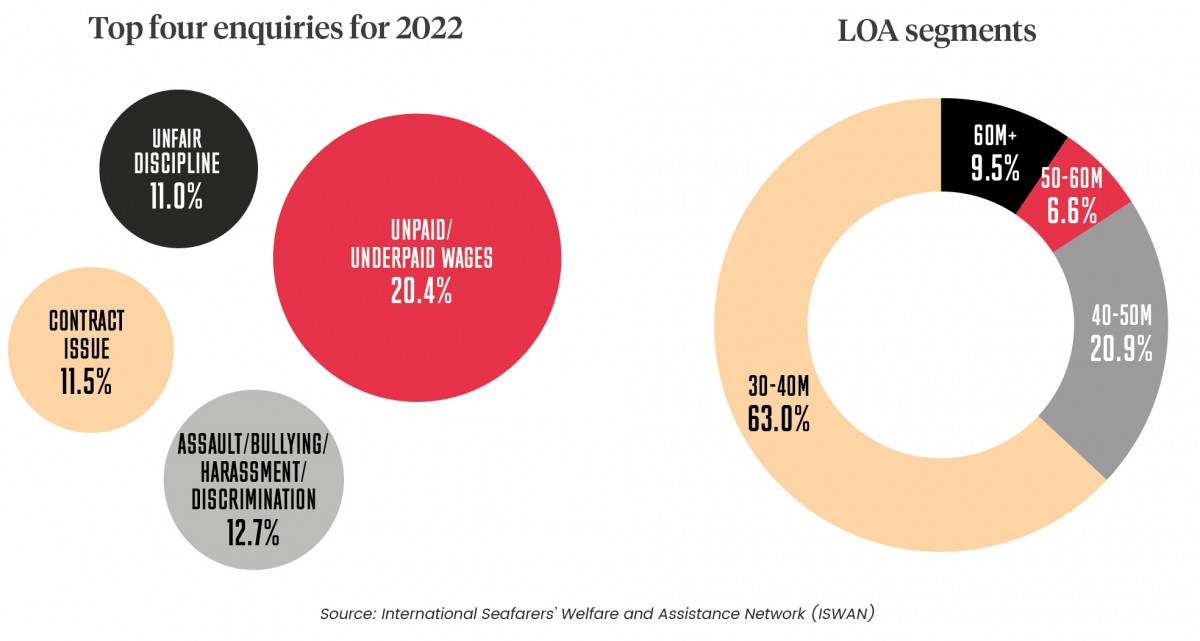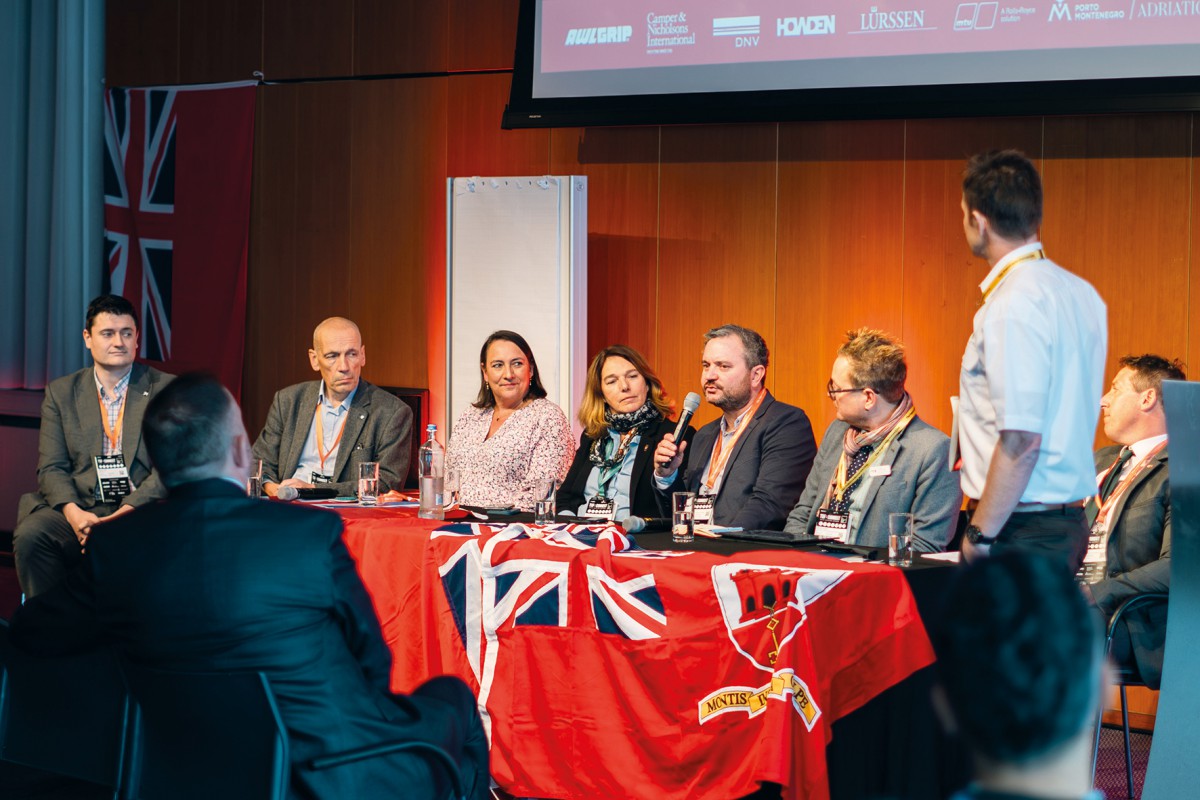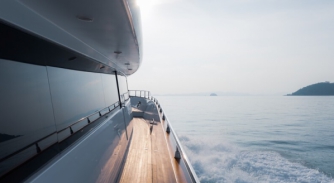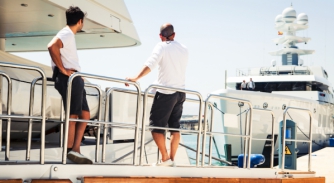‘We’ve got to invest in our crew’
The Crew Welfare workshop at The Superyacht Forum looked at mental health, bullying and harassment, unpaid wages, targeted training and confidential helplines…
As part of a new initiative at TSF: Connect, 100 captains and senior crew were invited to the Crew Welfare workshop as VIP guests to impart their insights and provide a direct voice to the regulators and organisations central to life on board.
The workshop was hosted by the Red Ensign Group, and the presence and importance of the Flag state were also central to the discussion but, crucially, the floor was open to a wider cross-section of the crew sector.
The potentially harsh realities of seafaring are universally acknowledged, with the superyacht sector being no exception. Long anti-social working hours, compounded by cramped living conditions and limited social spaces on board, have been identified as underlying drivers. Alongside this, crew often find it difficult to speak up when there is an issue as they are worried about losing their job. This arduous environment, with separation from society at large for significant periods, often precipitates feelings of isolation, abandonment and loneliness.
There has been justifiable criticism of the industry in the past for being too reactive to issues relating to crew welfare, so this session also served as a follow-up to the extensive work undertaken behind the scenes to address some of the findings of recent data-led studies that have identified areas of concern.
A multi-sector network of industry leaders called ‘Changing Tack’ hosted round-table discussions in May and November 2023, chaired by renowned sailor Dee Caffari MBE. Coordinated by the UKSA, it assembled a broad spec-trum of stakeholders from within the maritime industry and kickstarted a few key initiatives.
Alongside the roundtable group, another think tank, operating under the banner ‘Raising the Bar’, examined the repercussions of high crew turnover. This survey highlighted the importance of effective leadership and calculated the financial cost of crewmembers seeking better opportunities elsewhere. These findings align with those of the roundtable, emphasising the benefits of effective management for both crew and guests.
‘Changing Tack’ is offering a new approach to yacht crew welfare. Bringing together the data from various surveys and reporting structures, the group was established through collaboration between organisations such as The Seafarers Charity, Nautilus International, ISWAN and the UKSA, with many other companies offering their support to the group.
Their collective efforts represent more than 4,500 people in the superyacht sector and aim to offer a data-supported mechanism to evaluate the progress of initiatives such as ‘Raising the Bar’. Some of the overarching findings from the Combined Data Sets on Enquiries for ISWAN & Nautilus International were shared.
The report also alluded to more alarming concerns. Other notable trends included issues relating to contract issues increasing by 22 per cent year-on-year, as well as a sharp 41 per cent increase in calls relating to unpaid wages. Worryingly, abuse, bullying, harassment and discrimination contacts increased by 63 per cent year-on-year, accounting for eight per cent of all issues raised and 13 per cent of all issues raised by women.

The multiple detailed reports highlighting yachting’s issues with human capital, crew retention and mental health in recent years made it prudent to bring the relevant parties together. This session highlighted for this author (and crewmember) the challenge of addressing crew issues somewhat remotely.
What was evident from the session is that this topic, when discussed in an open format with so many stakeholders, is challenging to define. The term ‘crew welfare’ represents such a wide range of issues and underlying concerns that the conversation can take many pathways, even in a 75-minute workshop.
Marianne Danissen, head of yacht management at Camper & Nicholsons, said crewmembers often hesitate to seek support from unions or Flag state authorities due to apprehensions about the legal implications. “We want to avoid situations where seafarers feel the need to contact the union or Flag state authorities because the word ‘union’ often scares people due to its legal approach.”
Danissen acknowledged the value of unions in providing support to seafarers but emphasised the need for preventative measures to ensure crewmembers are aware of their rights and duties from the start.
Effective management and induction play pivotal roles in ensuring crew are well-informed and equipped to navigate their roles successfully.
Danissen also underlined the significance of a robust on-boarding process. “The induction at the start of employment is crucial,” she said. It is during this phase that crew-members should not only understand their rights, but also their responsibilities and how to access information when needed. This approach lays the foundation for a positive crew experience.
Chris Frisby, director of training and operations, UKSA, stressed the importance of education beyond basic qualifications and emphasised the need to go beyond standard training syllabuses. “We aim to deliver more than what the syllabus requires,” he said.
Frisby collaborates with industry experts to provide targeted training on critical topics such as the Maritime Labour Convention (MLC) and the significance of having a proper contract in place before embarking on a vessel. UKSA’s industry guidance and welfare teams support students while they are studying at the Academy, as well as once they are out in the industry. These additional insights are invaluable for crewmembers and help them navigate the complexities of their roles more effectively.
 Chris Frisby (with microphone), director of training and operations, UKSA, speaking about crew welfare.
Chris Frisby (with microphone), director of training and operations, UKSA, speaking about crew welfare.
In addition to formal training, it’s essential to create a supportive environment on board where crew feel comfortable discussing challenging topics. Karen Passman, founder of Impact Crew, advocates for senior crewmembers to learn the skills needed to handle difficult conversations before they escalate.
Passman also highlighted the importance of transparency in financial matters. She said, “Creating transparency, especially regarding financial matters like crew pay and increases, can be beneficial. Open dialogue can prevent misunderstandings and foster a healthier working environment.”
Simon Grainge, chief executive, International Seafarers’ Welfare & Assistance Network, a maritime welfare charity that operates helplines for seafarers worldwide, emphasised the significance of providing a confidential space for crew to discuss their concerns. He pointed out, “Around 16 per cent of the calls are related to mental health and well-being, with about 30 per cent of those concerning bullying and harassment.” Having a helpline allows crewmembers to seek help without involving their crewmates, employers or family members, therefore ensuring privacy and support.
“Maritime welfare organisations have been really geared towards the merchant fleet,” said Grainge. “So about three years ago, we were funded to do some research among yacht crews to talk to them about the issues that they were facing, what kind of support they needed. And one of the recommendations was that there should be a specific helpline for yacht crew.”
This led to the establishment of Yacht Crew Help, a round-the-clock, confidential helpline offering support and guidance for yacht crew in 12 languages across a multi-platform system.
Addressing the issue of new crewmembers entering the industry, Martyn EJ Gray, executive officer at Nautilus International, highlighted the need for guidance and support, esp-ecially for junior crew. “We, as a union, guide crew through, signpost them to emotional support and engage with management companies, with owners, with captains and Flag state authorities to report these issues and get them dealt with.” This multifaceted approach is essential to resolving issues effectively.
Highlighting the discrepancy between the superyacht industry’s approach to welfare and that of other industries, Passman said, “Multi-million-dollar businesses invest hugely in their people. They’re going to step up into management, so they get some leadership training every couple of years. How much does it actually cost to replace crew? Even for a junior crewmember, you’re looking at around €15,000.”
Grainge concluded with a concern in the industry about recruiting crew in the future, similar to the dilemma in the merchant fleet. With around 50,000 crew needed to man the current fleet, and with almost 200 coming online every year, the industry will need to address its issues to continue to sustainably operate the fleet at a high level.
“A guide in itself is not enough,” said Grainge. “The next generation of crew will have other interests and will view their employment differently. If you want to generate people for the future, future crews, you’ve got to invest in them.”
The Changing Tack working group is continuing its research to create recommendations for the industry.
TSG is passionate about crew welfare and will be working with the group to influence the industry on how they can support their crew.
NEW: Sign up for SuperyachtNewsweek!
Get the latest weekly news, in-depth reports, intelligence, and strategic insights, delivered directly from The Superyacht Group's editors and market analysts.
Stay at the forefront of the superyacht industry with SuperyachtNewsweek
Click here to become part of The Superyacht Group community, and join us in our mission to make this industry accessible to all, and prosperous for the long-term. We are offering access to the superyacht industry’s most comprehensive and longstanding archive of business-critical information, as well as a comprehensive, real-time superyacht fleet database, for just £10 per month, because we are One Industry with One Mission. Sign up here.
Related news

Demand for crew support grows
Calls to ISWAN’s crew helpline have increased with rising trends in reports of poor mental health, unpaid wages and abuse
Crew

Nautilus recovers over £2.75 million for yacht crew
Nautilus International recovered a record of over £2.75 million in unpaid wages and benefits.
Crew
.jpg)
UKSA Mental health Awareness week
We speak with UKSA's new welfare officer, Gemma Maskell, about mental health in the superyacht industry
Crew

£1.6 million in unpaid crew wages reclaimed
Nautilus have reclaimed a huge amount of unpaid superyacht crew wages in 2021 and they are expecting more for 2022
Owner
Related news
Demand for crew support grows
1 year ago
UKSA Mental health Awareness week
3 years ago
£1.6 million in unpaid crew wages reclaimed
3 years ago
NEW: Sign up for
SuperyachtNewsweek!
Get the latest weekly news, in-depth reports, intelligence, and strategic insights, delivered directly from The Superyacht Group's editors and market analysts.
Stay at the forefront of the superyacht industry with SuperyachtNewsweek



